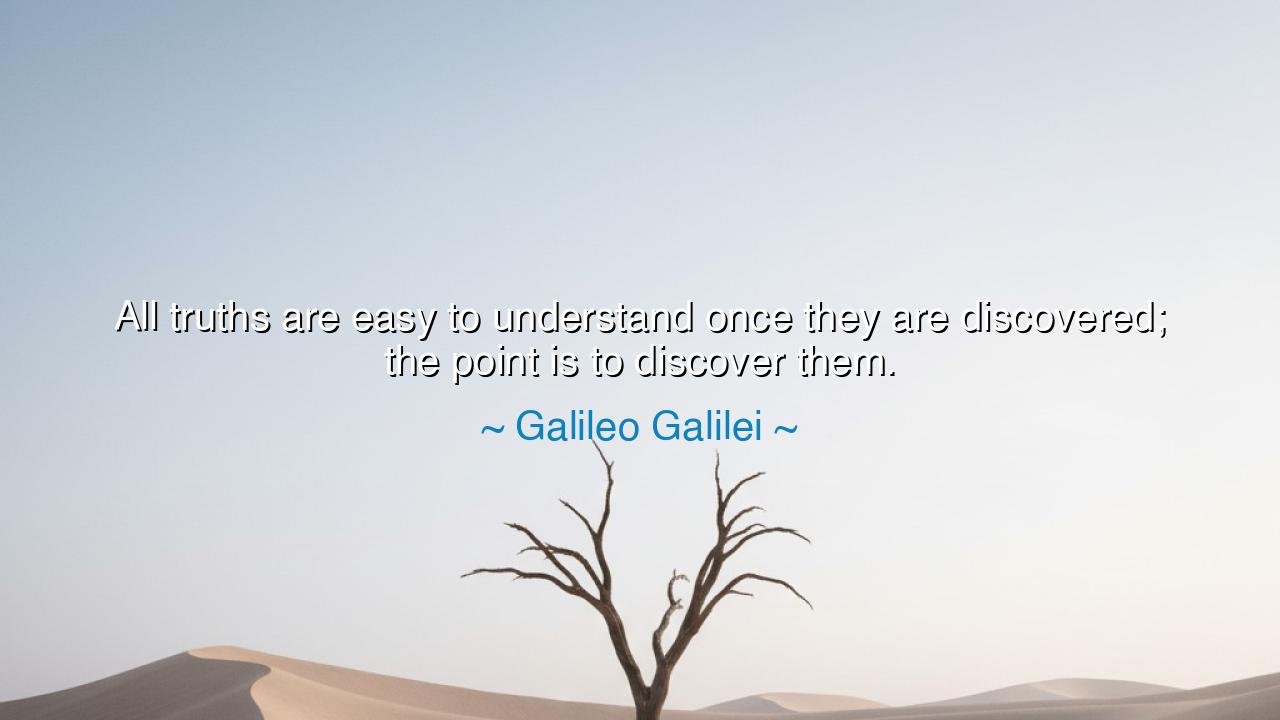
All truths are easy to understand once they are discovered; the
All truths are easy to understand once they are discovered; the point is to discover them.






Hear, O seekers of light, the words of Galileo Galilei, who looked through the telescope and saw the heavens anew. He proclaimed: “All truths are easy to understand once they are discovered; the point is to discover them.” In this statement lies the agony and triumph of knowledge itself. For the universe is not silent—it speaks in laws and patterns, in stars and seas, in the whisper of reason. Yet it waits for eyes brave enough to see, for minds willing to uncover what has always been there.
The meaning is clear: the difficulty of truth is not in its nature, but in our blindness before it is found. Once revealed, truth stands simple, clear, and undeniable, like the sun rising in the east. To say that the earth moves around the sun is plain today, as plain as water flowing downhill. Yet in Galileo’s time, this was heresy, a flame against the great edifice of accepted belief. Men raged, priests thundered, rulers condemned—but the truth did not change. Once discovered, it became obvious to all who dared to see.
Think of Christopher Columbus, who sailed westward in search of another route to India. The truth—that a vast continent lay between—was always there, waiting for discovery. Once revealed, it seemed simple: the land was not hidden, only unseen. So too with the laws of gravity, which Newton revealed. Men had always watched the apple fall, yet only when one man asked why did the truth show its face. Once revealed, it became so obvious that even children now understand what had eluded sages for millennia.
Galileo himself bore the cost of this pursuit. He was forced to kneel before the Inquisition, to deny what his eyes had seen. Yet even in chains, the truth did not vanish. It lived in silence until the world was ready, and when the time came, it shone brighter than ever. His words remind us that the pain lies in discovery, in cutting through ignorance and fear, but once the veil is torn, understanding flows with ease.
So it is not only in the grand halls of science that this law holds true. In the smallest matters of our lives, the same pattern endures. How often have we wrestled with confusion, only to find, once the answer comes, that it was simple all along? The quarrel that seemed endless dissolves with a word of forgiveness. The problem that seemed unsolvable reveals its solution with a shift of perspective. Truth was never far—it was waiting for us to turn the key.
O children of tomorrow, learn from this: do not despair when truth seems hidden. Do not curse its difficulty, for the veil is only temporary. The point is not to lament that we do not yet understand, but to labor, to search, to question, to endure the pain of seeking until the light dawns. For once the dawn comes, the path is clear, and all can walk it.
Practical is this wisdom: cultivate curiosity, for it is the lamp that guides you through darkness. Ask questions when others are silent, seek answers when others are content with ignorance. Read, observe, experiment, and do not fear to challenge what seems immovable. And when truth reveals itself, share it with others, so that they too may see what now seems simple.
Thus spoke Galileo, and thus we must remember: all truths wait to be seen. They are not beyond us, only hidden until sought. And the glory of man, the destiny of the soul, is not to invent truth, but to discover it—and in discovering, to awaken the light already written into the fabric of the universe.






PNPhuong Nguyen
I find this quote incredibly humbling because it acknowledges that discovering truths is hard work. The moment of realization, when something finally makes sense, often feels like a breakthrough. But what if the truth we discover isn’t what we expected? Can we truly accept a truth that challenges everything we thought we knew? Or is there always some resistance to new truths until they become universally accepted?
UGUser Google
This quote makes me think about the frustration of searching for answers. So often, it feels like we’re lost in a sea of possibilities, only to realize later that the truth was much simpler than we imagined. But is it possible to ever truly discover a universal truth, or is truth always subjective and evolving with new perspectives and knowledge? How do we know when we’ve really discovered a truth versus just scratching the surface?
EDThai E Do
Galileo's words are a powerful reminder of how we often take the truths we uncover for granted once we understand them. But how do we separate what is truly a ‘truth’ from what is just a convenient answer? What happens when our search for truth leads us down the wrong path, and we end up believing something that’s not actually true? How can we ensure that our discoveries are grounded in reality?
KHNGUYEN KHANH HUYEN
This quote really makes me think about how we often overlook the difficulty of discovering truths. Once we find them, they seem so simple, so obvious, but the discovery process itself is so challenging. How do we develop the patience and mindset to uncover these truths, especially when it feels like the answers should be clear from the beginning? Does this mean that truth is often hidden in plain sight, just waiting for us to see it?